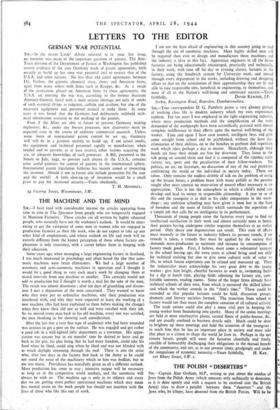THE MACHINE AND THE MIND
have read with considerable interest the articles appearing from time to time in The Spectator from people who are temporarily engaged
in Munition Factories. These articles are all written by highly educated people, who naturally have not the workmen's outlook. It would be inter- esting to get the viewpoint of some men or women who are engaged in production factoriei as their life work, who do not expect to take up any other kind of employment, and whose outlook on life and work will be entirely different from the keener perception of those whose factory em- ployment is only transitory, with a career before them in keeping with their education.
Some years ago, when managing a large engineering factory in Scotland, I was much interested in psychology and often heard the jibe that auto- matic machines were brain eliminators. We had a large number of automatic and semi-automatic machines in operation and I thought it would be a good thing to vary each man's work by changing them at stated intervals from one machine to another. This certainly would not add to production but I thought it worth a trial for the sake of the men. The result was almost disastrous ; after ten days of grumbling and discon- tent I met a deputation of the men concerned. They wanted to know why they were put to unfamiliar machines, why their production was interfered with, and why they were expected to learn the working of a new machine (this had been explained to them before making the change) when they knew their old one so well and were satisfied with their job. So we moved every man back to his old machine, every one was satisfied, the men thanking us for showing such consideration.
After the last war a very fine type of coalminer who had been wounded was anxious to get a post on the surface. He was engaged and got rather
■ good job in a well-lighted lofty department as a storeman. His appre- ciation was sincere but in six months' time he desired to leave and go back to the pits, his plea being that he had more freedom, could take his food when he liked, could sing when he liked and was not blinded with so much daylight streaming through the roof. There is also the artist who, after two days in the factory fled back to the Army as he could not stand the noise of the machinery which to him was bedlam, but to me was music. Providence has mercifully given us all a different outlook. Mass production has come to stay ; intensive output will be necessary to keep us in the competitive world markets, and the automatic will always be with us. The machine age is only in its infancy and every day we are getting more perfect operational machines which may mean less mental strain on the work people but should not interfere with the lives of those who like this sort of work. I am not the least afraid of engineering in this country going to seed through the use of automatic machines. More highly skilled men will be required than ever to design and manufacture those machines and the industry is alive to this fact. Apprentice engineers in all the better factories are being educationally encouraged, practically and technically, in their work, with time off for day or evening classes, lectures in the factory, using the Sandwich system for University work, and moved through every department in the works, including drawing and designing offices so that on the termination of their apprenticeship they are fit and able to take responsible jobs, beneficial to engineering, to themselves, and most of all to the Nation's well-being and continued success.—Yours faithfully, DAVID KEACHIE, J.P. Sorbie, Kessington Road, Bearsden, Dumbartonshire.


























 Previous page
Previous page